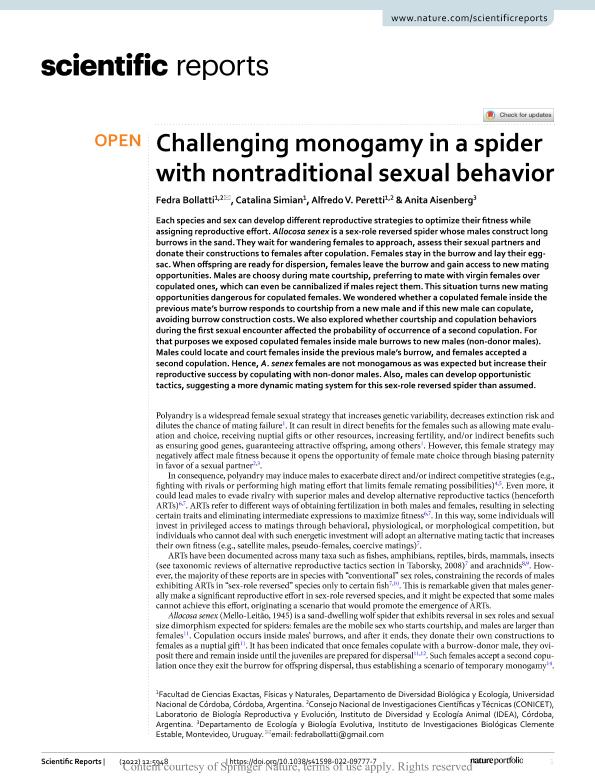Mostrar el registro sencillo del ítem
dc.contributor.author
Bollatti, Fedra Ariana

dc.contributor.author
Simian, Catalina

dc.contributor.author
Peretti, Alfredo Vicente

dc.contributor.author
Aisenberg Olivera, Anita Diana

dc.date.available
2023-07-10T15:34:52Z
dc.date.issued
2022-04-08
dc.identifier.citation
Bollatti, Fedra Ariana; Simian, Catalina; Peretti, Alfredo Vicente; Aisenberg Olivera, Anita Diana; Challenging monogamy in a spider with nontraditional sexual behavior; Nature Publishing Group; Scientific Reports; 12; 1; 8-4-2022; 1-10
dc.identifier.issn
2045-2322
dc.identifier.uri
http://hdl.handle.net/11336/202995
dc.description.abstract
Each species and sex can develop different reproductive strategies to optimize their fitness while assigning reproductive effort. Allocosasenex is a sex-role reversed spider whose males construct long burrows in the sand. They wait for wandering females to approach, assess their sexual partners and donate their constructions to females after copulation. Females stay in the burrow and lay their egg-sac. When offspring are ready for dispersion, females leave the burrow and gain access to new mating opportunities. Males are choosy during mate courtship, preferring to mate with virgin females over copulated ones, which can even be cannibalized if males reject them. This situation turns new mating opportunities dangerous for copulated females. We wondered whether a copulated female inside the previous mate's burrow responds to courtship from a new male and if this new male can copulate, avoiding burrow construction costs. We also explored whether courtship and copulation behaviors during the first sexual encounter affected the probability of occurrence of a second copulation. For that purposes we exposed copulated females inside male burrows to new males (non-donor males). Males could locate and court females inside the previous male's burrow, and females accepted a second copulation. Hence, A.senex females are not monogamous as was expected but increase their reproductive success by copulating with non-donor males. Also, males can develop opportunistic tactics, suggesting a more dynamic mating system for this sex-role reversed spider than assumed.
dc.format
application/pdf
dc.language.iso
eng
dc.publisher
Nature Publishing Group

dc.rights
info:eu-repo/semantics/openAccess
dc.rights.uri
https://creativecommons.org/licenses/by/2.5/ar/
dc.subject
Sexual selection
dc.subject
Sex roles
dc.subject
Polyandry
dc.subject
Alternative reproductive tactics (ARTs)
dc.subject.classification
Zoología, Ornitología, Entomología, Etología

dc.subject.classification
Ciencias Biológicas

dc.subject.classification
CIENCIAS NATURALES Y EXACTAS

dc.title
Challenging monogamy in a spider with nontraditional sexual behavior
dc.type
info:eu-repo/semantics/article
dc.type
info:ar-repo/semantics/artículo
dc.type
info:eu-repo/semantics/publishedVersion
dc.date.updated
2023-07-07T19:05:06Z
dc.journal.volume
12
dc.journal.number
1
dc.journal.pagination
1-10
dc.journal.pais
Reino Unido

dc.journal.ciudad
Londres
dc.description.fil
Fil: Bollatti, Fedra Ariana. Consejo Nacional de Investigaciones Científicas y Técnicas. Centro Científico Tecnológico Conicet - Córdoba. Instituto de Diversidad y Ecología Animal. Universidad Nacional de Córdoba. Facultad de Ciencias Exactas Físicas y Naturales. Instituto de Diversidad y Ecología Animal; Argentina
dc.description.fil
Fil: Simian, Catalina. Consejo Nacional de Investigaciones Científicas y Técnicas. Centro Científico Tecnológico Conicet - Córdoba. Instituto de Diversidad y Ecología Animal. Universidad Nacional de Córdoba. Facultad de Ciencias Exactas Físicas y Naturales. Instituto de Diversidad y Ecología Animal; Argentina
dc.description.fil
Fil: Peretti, Alfredo Vicente. Consejo Nacional de Investigaciones Científicas y Técnicas. Centro Científico Tecnológico Conicet - Córdoba. Instituto de Diversidad y Ecología Animal. Universidad Nacional de Córdoba. Facultad de Ciencias Exactas Físicas y Naturales. Instituto de Diversidad y Ecología Animal; Argentina
dc.description.fil
Fil: Aisenberg Olivera, Anita Diana. Instituto de Investigaciones Biológicas "Clemente Estable"; Uruguay
dc.journal.title
Scientific Reports
dc.relation.alternativeid
info:eu-repo/semantics/altIdentifier/url/https://www.nature.com/articles/s41598-022-09777-7
dc.relation.alternativeid
info:eu-repo/semantics/altIdentifier/doi/http://dx.doi.org/10.1038/s41598-022-09777-7
Archivos asociados
